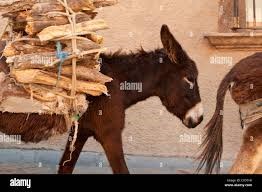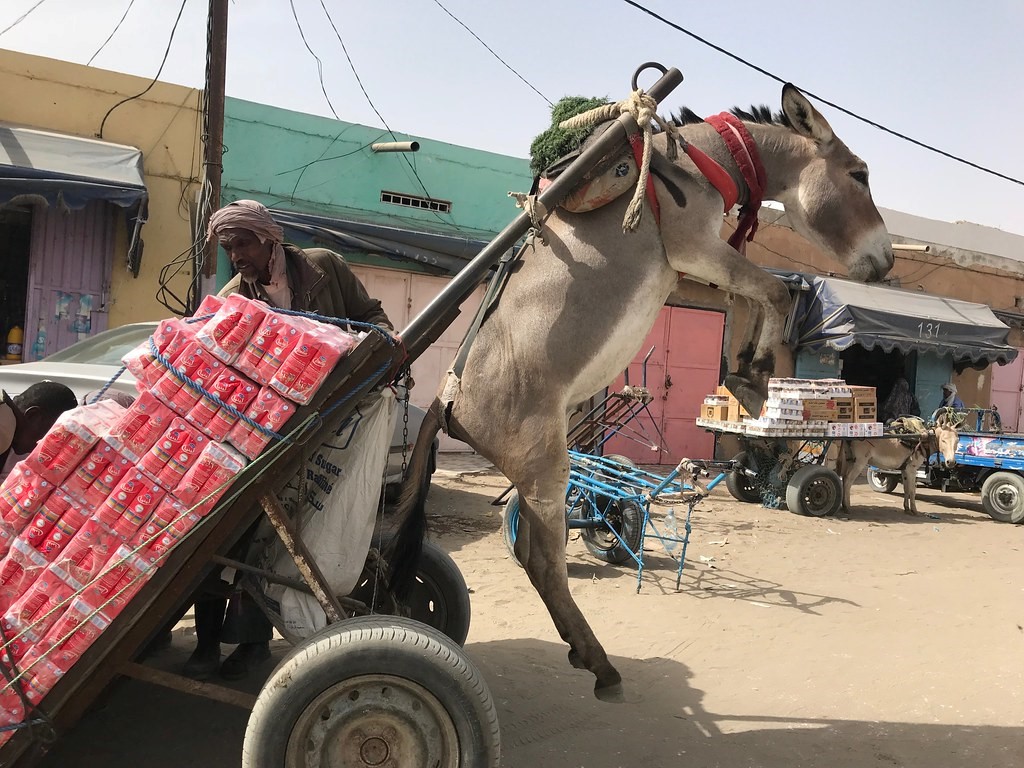In Defense of Donkeys
By Dr Ibikunle Faramade
Donkeys, (Equus asinus) is a domestic ass belonging to the horse family, equidae. They descended from the African wild ass (Equus africanus). They have been in use, serving humanity as a beast of burden from around 4000BC. Pictures of donkeys abound in the tombs of Egyptian Pharaohs and not less than 82 biblical references relate to donkeys. In ancient Rome, donkeys were used for pack transport and agriculture. Mules, that is, the offspring of a male donkey and a female horse were important in military campaigns from about 200BC until the First World War. A hinny is a cross between a male horse and a female donkey.
Today, the population of donkeys, globally, is estimated to be between forty and fifty million, with about half in Asia, just above a quarter in Africa and the rest in Latin America. On the average, donkeys could reach a height of 101.6 cm at the shoulder level and could weigh between 250 kg and 544kg depending on the breed.
The color of donkeys range from white to grey or black. They also usually have dark stripe from the mane to the tail and a crosswise stripe on the shoulders. The mane is short and upright. The tail appears more like cow tail than horse tail. Donkeys are generally slower than horses, they are also more sure footed and can carry heavy loads over rough terrains. They are highly intelligent and possess retentive memory. Donkeys can remember locations and paths they have taken as far back as about 25 years! The gestation period of donkeys vary between 11 and 14 months and their live expectancy is between 27 and 40 years. Donkeys are classified as endangered species under the Convention on International Trade in Endangered Species of wild Fauna and Flora to which Nigeria is a signatory. Interestingly, the 8th of May annually is designated world donkey day in recognition of their valued contribution to human society.
Donkeys contribute significantly to sustainable livelihood, especially in the rural areas which are hard to reach, even with conventional modes of transportation. They survive in arid areas where other animals may find difficult to thrive. Their means of contributing to sustainable development and livelihood includes; serving chiefly as a beast of burden, transporting humans, goods and services and as a means energy for traction of agricultural ploughs. Their roles in transportation are performed in the following forms:
- Human Transportation: Donkeys are used in many rural areas in Nigeria and most part of the world, especially in arid areas that may not support the survival of other categories of animals.

- Water transportation: donkeys are used to fetch water for human use in areas where the location of the water source is far away from human settlement. They carry water by means of different containers such as jerry cans or local water bags made of leather.

- Energy Transportation (firewood): They are used to carry firewood needed as primary source of energy in many rural areas.

- Agriculture: Donkeys are used in many resource poor areas with poor agricultural infrastructural deficits. They are used to provide traction for ploughs during land cultivation.

The welfare of donkeys performing these tasks require the attention of donkey owners. The major welfare issues confronting donkeys is associated with over loading, over driving, in-adequate feeding and lack of access to veterinary medical attention. This is against the spirit of sections 207-209 of the Penal Code operating in Northern Nigeria, where acts of cruelty to animals is defined to include torturing of animals, ill-treatment /injury of animals, depriving animals of their liberty, overloading, over -driving, neglecting a sick, aged or wounded animal, administering a poisonous drug or substance to an animal, employing an animal which is not in good condition to work and promoting or arranging fights between domestic animals such as cocks, rams, etc.
The enforcement of the above law aimed at prevention of animal cruelty was demonstrated in Sokoto in April 2018, where the Premium Times Online News reported that a Sokoto Magistrate Court ordered the remand of two men over alleged cruelty to their donkey because they rode and allowed the donkey to be knocked down by a car. After the donkey sustained injury in the accident, the two accused persons were arraigned on a two- count charge of conspiracy, riding and neglecting an animal.

Overloading of donkeys describe a situation where the donkey is loaded with goods that are heavier than the donkey could carry, making it to cave in under pressure, suffering injuries and pain.

Major Challenges Confronting Donkeys in Nigeria
The major challenge facing donkeys globally is that of illegal slaughter as food animal for their meat and skin. Some Chinese herbal medicines are reported to have derivatives from the donkey skin, called ejiao (processed from the donkey’s skin collagen) as a core component or active ingredient. This has led to rapid depletion population of donkeys in China. As a result, there is acute shortage of donkeys in the country making them to rely on supplies mainly from Africa through illegal trade in donkey and donkey products. This has led to rapid decline in the population of donkeys in Africa, especially, Nigeria.
Against this backdrop, African leaders have imposed a continent- wide fifteen years ban on the slaughter of donkeys. Donkeys have long gestation period, spanning between 11 and fourteen months. Twinning is also rare, consumption has exceeded production, and therefore, urgent actions are necessary to prevent driving this precious animals into extinction.
The sustained advocacy of many concerned individuals and organizations, for example, Honorable Mohammed Datti, former Chairman, House of Representative Committee on Agriculture on the floor of National Assembly and the World Donkey Sanctuary preceded this continent –wide ban which came to effect in February, 2024. For his consistence advocacy against the illegal donkey trade, Honorable Datti has been strongly commended by many organizations including the African Network of Animal Welfare. Therefore, it is now illegal to slaughter donkeys in Nigeria.

Prior to the ban imposed by the African Union, West African Countries under (under the umbrella of Economic Community of West African States, (ECOWAS), had specifically signed a Memorandum of Understanding prohibiting all veterinary officers in in West Africa from issuing permits for donkeys movement, slaughter and prevent export.
Many Donkeys are Slaughtered Annually
About 5.9 million donkeys are slaughtered annually to meet the ever increasing demand for ejiao in China. In fact, the projected demand for donkeys by 2027 is about 6.8 million (if nothing is done). This impacts negatively on the sustainable livelihood of more than an estimated 158 million people that rely on them as livelihood asset. The impeding loss of huge number of donkeys would shift the pressure of labor on women and children who may have to replace the labor supplied by donkeys, further aggravating the possibility of achieving sustainable development goals by 2030. It is therefore hoped that the implementation of the ban on slaughter of donkeys in respective countries would save the estimated 33 million donkey population in Africa.
Dismantling the Complex Cross Border Syndicate
The illegal trade in donkey thrives on clandestine activities of cross border criminals working in unison with international freight organizations. Smuggling routes involve many countries, including Togo, Cameroon, Gabon, DR Congo, the Republic of Congo, the Central African Republic, Liberia, Cote d’Ivoire and Benin. The war against illegal trade in donkeys cannot be won without the cooperation among African countries. The Nigerian Custom Service and the Nigerian Agricultural Quarantine Service among other agencies also need to work in synergy to burst the activities of this syndicates. The Nigerian Custom Service however deserves commendation in this regards. In July, 2022, it was reported that the Custom Service intercepted over 2,820 donkey skins worth 42 million naira in Kebbi State. About the same time, 2,754 donkey genitals were recovered along with 3712 donkey skin valued at 418 million naira. Just last week, 9th May, 2024, live ammunition, donkey genitals weighing 58kg and tramadol worth 5.7 billion naira were recovered. This is highly commendable. If these efforts are sustained, it is sure that donkeys would not be driven into extinction.
Donkey Farming
The Society for Animal Rights Protection is in support of the idea of boosting the population of donkeys through donkey farming. This conscious efforts along with the ban on illicit trade in donkeys will reduced the time frame for the rejuvenation of donkey population in Nigeria. When the plan succeeds, other countries could also use the template, resting on Nigeria’s success story.
In conclusion, the donkey breeding and productivity strategy should be developed by African Union- Inter African Bureau of Animal Resources (AU-IBAR) and other relevant organizations within the 15-year window offered by the ban imposed by the African Union. This is the only sustainable way of guaranteeing the maintenance of sustainable population of donkeys, especially in Africa.
Dr. Ibikunle Faramade is a veterinary pathologist, sustainable development practitioner, animal welfare advocate and a lecturer at the Federal College of Animal Health & Production Technology, Apata. Ibadan. He’s the C.E.O of the Society for Animal Rights Protection, a non-profit and a non-governmental organization dedicated to the promotion of animal welfare, animal rights and prevention of cruelty to animals. animalrightsprotection2020@gmail.com , +2348028305284




